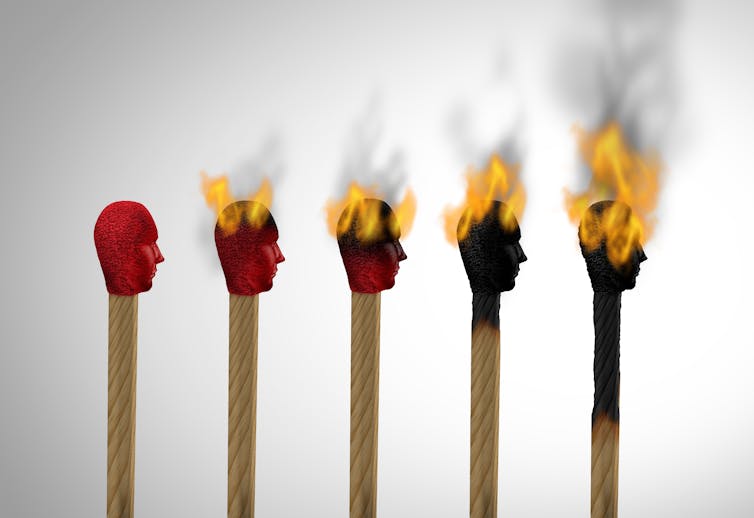When asked about political news consumption in the weeks leading up to the 2024 U.S. presidential election, one patient said, “I definitely don’t follow the news anymore.”
This conversation arose when I spoke with a local television station about why there are fewer signs in political venues during this year’s election cycle compared to past election periods.
I’m a psychiatrist who studies and treats fear and anxiety. During the 2016 and 2020 election cycles, one of my main mental health recommendations to my patients was to watch less political news. I also tried to convince them that spending five hours a day watching cable news would only make them powerless and frightened.
But over the past few years, I’ve noticed a change. Many of my patients tell me that they can only skim political news or watch an hour of their favorite political show, or that they are too tired.
Research supports my clinical experience: A 2020 Pew Research study showed that 66% of Americans are exhausted by political stress. Interestingly, those who don’t follow the news are even more likely to feel fatigued by the same news at 73%. In 2023, 8 in 10 Americans described American politics in negative terms such as “divisive,” “corrupt,” “messy,” and “polarized.”
In my view, three major factors have left Americans exhausted and burnt out by American politics.

Robert Nickelsburg/Getty Images
1. Politics of fear
My 2023 book, AFRAID: Understanding the Purpose of Fear and Harnessing the Power of Anxiety, explores how American politicians and mainstream news organizations have found an ally in fear: our attention. It discusses very strong emotions that can be used to draw. , keeping us on tribal lines and making us follow, click, tap, watch, and donate.
Over the past several decades, many people have felt that a strong push toward tribalism, an “us versus them” worldview, has pitted Americans against each other. This has led us to a point where we are not just at odds with each other. We hate, cancel, block, and attack those who disagree with us.
2. People live in an information bubble
It may feel like commentators on Fox News and MSNBC are talking about America from two different planets. The same is true regarding your various social media feeds.
Many people participate in social media communities that are closed to the world outside of their homes and familiar social circles. Based on people’s political views and what they search, watch, and read, social media algorithms serve up content that everyone speaks and thinks the same way. If you listen to the other person, it’s only about their worst attributes and behaviors.
The gulf is so great that people can’t even understand how people think from other points of view, and find their logic and political beliefs incomprehensible.
Many Americans have reached the point where they believe the other half of Americans are unintelligent and stupid at best. At worst, it is immoral and evil.
3. People’s political opinions have become their identity.
There was a time in American politics when two politicians or two neighbors could disagree but believed that the other was fundamentally good.
Over time, and even more so since the early 2000s, this ability to connect despite political beliefs has diminished.
In a 2022 Pew Research survey, a majority of Democrats and Republicans said someone’s political beliefs are an indicator of their morality and character.
This 2022 Pew study also shows that partisan hostility extends to judgments about character, with 72% of Republicans and 63% of Democrats saying their opponent’s members are more likely than other Americans. He said he believed it was “immoral.”
This is evident in the daily conversations of members of both political tribes. “How can I be friends with someone who tries to kill babies?” “How can I have a conversation with someone who is on the margins of society and is okay with the death of a woman?” This is the parking lot of a clinic. ” We can no longer view someone’s political affiliation in the context of their whole humanity.

iStock/Getty Images Plus
Perspectives on psychology and neuroscience
Fear, as a deeply ingrained survival mechanism, takes precedence over other brain functions.
Fear guides your memory, emotions, attention, and thoughts and can cause you to keep looking, scrolling, and reading to monitor this perceived threat. Positive or neutral news may become uninteresting because it is not important for survival responses. That has been the key to people’s deep engagement with fear-based political news.
However, if there is too much fear, a person cannot stay involved forever. It’s due to another survival mechanism called “learned helplessness.”
In 1967, American psychologist Martin Seligman exposed two groups of dogs to painful shocks. Dogs in group 1 were able to stop the shock by pressing a lever and quickly learned how to do this. However, the dogs in Group 2 learned that they could not control when the shock started and stopped.
Both groups were then placed in a box separated in half by a small barrier, and the shock was applied to only one side of the box. Although the dogs in group 1 had learned how to stop the shock in the previous experiment, they quickly learned to jump over the fence and move to the non-shock side. However, the dogs in group 2 made no attempt to do so. They learned that there is no point in trying.
This experiment has been replicated in various forms in other animals and humans, with the same conclusions. In other words, when people feel they can’t control a painful or frightening situation, they simply give up. During these experiences, the fear region of the brain called the amygdala becomes overactive. Meanwhile, under these conditions, activity in brain areas that control emotions, such as the prefrontal cortex, decreases.
Learned helplessness also means that the brain mechanisms commonly involved in controlling anxiety and depression are not working well.
When I work with patients who suffer from long-term high anxiety, fear, trauma, and fatigue, I often find that learned helplessness manifests itself in the form of depression, lack of motivation, fatigue, and lack of engagement with the world around them. You can see.
The COVID-19 pandemic, more than a decade of intense political stress, the polarization of social media and wars around the world, and public disillusionment with U.S. politics and media have left many people feeling burnt out and uneducated. I believe you are experiencing a feeling of helplessness.
If you feel politically exhausted, the problem is not you. Please feel free to use it away from noise.



